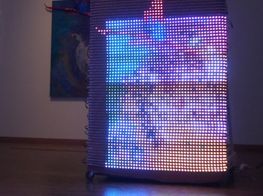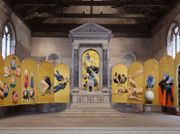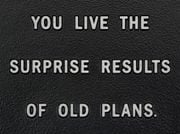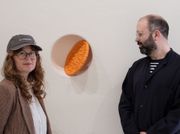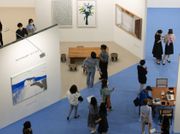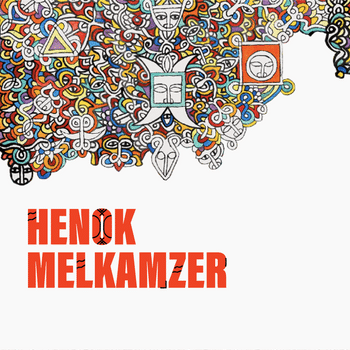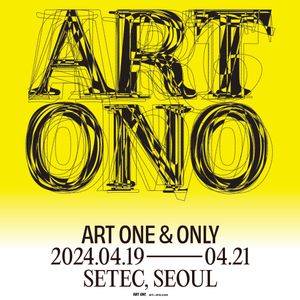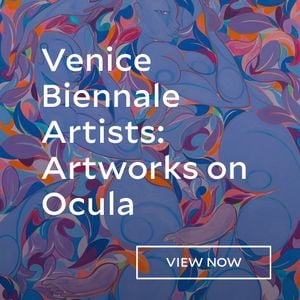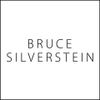Ei Arakawa
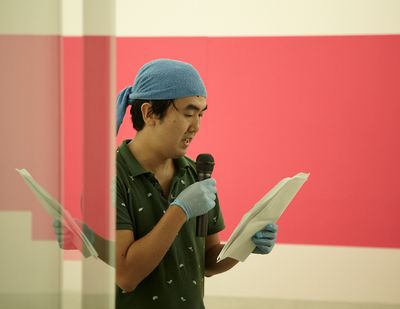
The artist, Ei Arakawa was born in Fukushima, Japan but has been based in New York since 1998. Working almost always collaboratively to produce a diverse body of performative work, the artist is known for employing cultural tropes to erode and question and interrupt boundaries of identity and artistic endeavor.
His most recent collaboration is UNITED BROTHERS, which involves performative work presented in cooperation with his brother, Tomoo Arakawa. The collaboration has been the focus of an exhibition at Halle für Kunst Lüneberg, and most recently was presented at Frieze London 2014 as part of the fairs new initiative ‘Live’, that aims to present ‘ambitious, active or performance-based installation’. The brothers’ presentation at Frieze is entitled Does This Soup Taste Ambivalent?
, and involves the duo offering Frieze visitors soup made by their mother from vegetables grown within the Fukushima prefacture, which is infamous for 2011 nuclear disaster. The Japanese Farmer’s Association has certified the ingredients of the soup as safe, but the soup poses the theoretical threat that it may be radioactive.
The presentation at Frieze was made in association with the itinerant Green Tea Gallery, which Ei and his brother formed with the purpose of inviting international artists to collaborate on new projects about Fukushima prefacture. As a solo artist, Ei Arakawa participated in Frieze projects in 2010, and his work has been presented at a number of major institutions and galleries, including: Gwangju Biennial, Korea (2014); Whitney Biennial, New York (2014), Tate Modern, London (2012); Kunsthalle Zürich, Switzerland (2011 and 2009); Le Printemps de Septembre, Toulouse, France (2011); The Museum of Modern Art, New York (2011); DAAD Gallery, Berlin (2011).
You are from Japan but based in New York?
Yes, I’ve lived there for 15 years. I went to School of Visual Arts for my BFA then Bard College for my Masters.
Your presentation at Frieze, Does this Soup Taste Ambivalent? is directly related to Fukushima, where you are from. So you have quite a personal relationship to this work?
Yes, that’s why I’m doing it. […]. In a way anyone can do things related to Fukushima, but because I’m from there, but based in outside of Japan, I had a strong desire to connect with things there.
When I am outside of Japan, like in New York, all I hear about Fukushima is the media experience, so I felt a bit distant from it. I have a lot of agency in contemporary art because of the performance practice I’m doing; so I started to undertake a dynamic exchange between the contemporary art world I’m participating in and the issue of Fukushima, borrowing help from my family.
My brother has a fantasy about the art world—he’s not really an artist— so we decided to form a unit called the UNITED BROTHERS to make art together. It started after the earthquake of 2011, and we deal with Fukushima related issues. One of my brother’s fantasies is to be a gallerist, so we created a fake gallery. So that’s Green Tea Gallery, even though our gallery has no sales record. Then, because Frieze started a live section this year, and it was free of charge, so we could be in Frieze! We had this chance to distribute this project at Frieze art fair.… The basic idea is that we serve the soup at 1pm everyday. My mother makes the soup; she came to the UK for the first time. She cooks soup using vegetable from Iwaki, Fukushima Japan.
So she harvested the vegetables herself?
She didn’t grow them. She bought them. It is dried radish and dried shitake mushroom, and we mix it with UK carrots and other vegetables. And we tested the vegetables with local NPO organisations, and it was found that Cesium-134 and Cesium-137, a very common substance of radiation, is zero, or only in very small amounts and I was told it is a natural substance called Bi214. The level of contamination depends on where the vegetable comes from; the food contamination does not mean that all food from Fukushima is contaminated. There are many organized regulations to figure out this. If you see the food at the market, then it has been checked for contamination and in this respect there is a definite scientific result regarding the contamination, at least for Cesium 134 and 137. But for the people outside of Japan, Fukushima is a media experience so science doesn’t matter. It’s a very negative effect for Fukushima.
When Frieze released the information about the performance, I think the PR company that Frieze hired somehow utilised the symbolic power of Fukushima to advertise Frieze art fair itself. So a lot of media was “Oh wow, Fukushima soup is served at the fair”; and at the same time a few of the sensationalist newspapers are calling it “radioactive soup”—overlooking any nuance.
Is this reaction from the media what you were hoping for? Does it assist in making a point?
Well, the title of the project is “Does this soup taste ambivalent?” The reason I used this title is because I didn’t want to say: “Yes this soup is safe”. It’s not a simple promotion about the safety of soup. I wanted to present the question to the wider audience so I could deal with the people who said “yes” and the people who said “no”.
I’m trying to make a platform where debate and discussion can happen. It’s not about the generosity of giving soup, but somehow about asking for trust. Sometimes it generates antagonism, for example if you come to the fair with friends, some eat the soup, but some don’t want to eat it; that kind of debate and reaction to the media hype and also psychological response to the media thing, is all part of this project.
So it is a contentious work. How do you see it in context of other projects for yourself?
Contentious—like an argument? Yes, UNITED BROTHERS want to work outside of Japan and create these kind of contentious situations.
But for my own work, I always maintain a resistance to what people want from me as a performance artist. Performance art is not the service. It should not be like so called entertainment. I want to reposition the situation of the audience and you have to be ready to be contentious too. At the same time, I don’t want it necessarily to be ‘right in your face’ or shock value tactics.
Like Chris Burden?
The soup project was initially hyped by UK sensationalist media even 2 weeks before it happens. That was crazy, but anyway, when I work I wanted to see the power relation within the certain contexts and try to figure out how we can interrupt, or resist, or somehow transform it. Frieze art fair is such a highly commercial space, when we applied this soup project I thought it would be interesting to present this question to the Frieze audience, which is made up of rich collectors and art intellectuals.
So have people been drinking the soup then?
Oh yes. This is day three, and over the last two days, the soup has gone very quickly. Between 30 minutes to 2 hours, about 80 to 100 soups are gone everyday.
Wonderful!
No, that doesn’t mean it’s a wonderful thing. I would say 1/5 of the people—the visitors to Frieze— are in a hurry to get along to the next thing. They hear about free soup. They just take a cup of soup. I don’t think they read the information on the wall. I wanted people to read about the risks related to the soup, and to ignite a discussion about the situation. The formal look of this soup projects reminds us Tiravanija’s communal sharing, but it functions differently…
And how long have you been collaborating with your brother then?
I think we started UNITED BROTHERS about three months after the earthquake, so its about three and half years now.
There is a film showing in the booth at Frieze, alongside the serving of the soup. Tell me about it?
My brother owns three tanning salons in or near Fukushima. After the nuclear disaster he received compensation from the power company, and what he did was to buy film equipment and a drone. So he became a filmmaker.
So he’s a self-educated filmmaker?
Yes, well but I think these days you don’t have to be an artist to be visually literate. We live in a super high visual culture now. He’s very flamboyant!
He’s more flamboyant than me. His sense of design is more contemporary and more fashionable. I noticed that he has become friends with my friends in the art world immediately. And they are very active artists in New York or Berlin art worlds. My brother asked my friends to be cast as characters in the movie. He started to create a science fiction movie about an android from Fukushima…to be honest the film is very bad!
[laughs]
Or, I shouldn’t say bad. It’s a B-movie-chic!But to defend my brother’s film, I think this movie production functions like a platform for professional artists to relate with Fukushima via UNITED BROTHERS. Meaning very active artists somehow got interested in what we are doing and where we are coming from. Some visited Japan, like Kerstin Brätsch, Richard Aldrich, Henning Bohl, Nikolas Gambaroff, Tobias Madison; they all came to Japan and related to Green Tea Gallery and UNITED BROTHERS. So somehow this B Movie-chic became a connecting tissue, even though the movie itself is enjoyable only to the people who are in it [laughs].
Without him I wouldn’t have created such wide artist community.
But the soup project isn’t light-hearted?
No, no, not really, Does This Soup Taste Ambivalent? is very serious. But usually when I do a project with my brother as UNITED BROTHERS, sometimes I externalise my own practice…sometimes I can do more light-hearted things with my brother. It’s a balance.
Do you feel that this soup project was successful?
I think it’s successful on two levels: one is social media which created a lot of discussion about the soup without actually tasting or seeing, which is very interesting as a performance artist; and another is the actual audience who came to Frieze, many of them understand our intentions and reflected own ways; silly way, antagonistic way, compassionate way, and nervous way. I’m not sure we will do this again, but in terms of the context of Frieze 2014, it was perfect.—[O]

